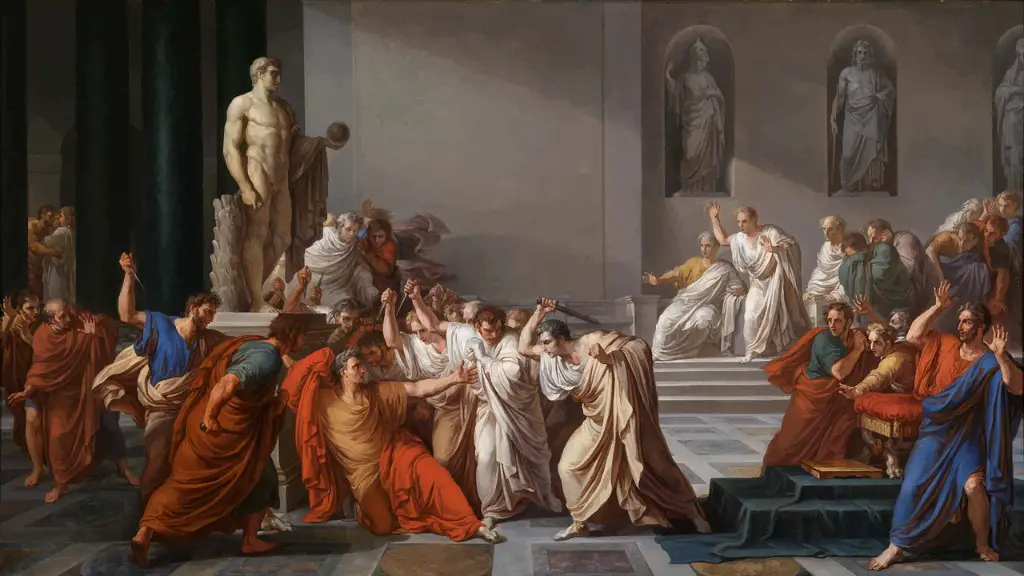Political Instability
In 476 AD, the western Empire fell, and the original form of government slowly began to decline. At the heart of the decline was a political system that was plagued by corruption and intrigue. The decline of the Roman Empire was caused by numerous factors, such as economic decline, military decline, political instability, and outside forces. One contributing factor to the decline was political instability. During the decline of the Empire, much of the political power and authority was concentrated in the hands of a few powerful leaders, who often jockeyed for power.
This resulted in a series of short-lived changes in leadership and a lack of continuity in policies. The political instability also led to a weakened bureaucracy, which further weakened the already fragile economy. This instability, in turn, created an atmosphere of distrust among the people and contributed to the decline of the Empire.
There were also other political issues that contributed to the decline, such as the rise of powerful and influential individuals and political factions. Many of these factions were driven by personal interests, leading to rivalries and infighting, which distracted from the stability and governance of the Empire. In addition, the rise of new religions, such as Christianity, also led to a decline in traditional Roman religion and cults.
The decline of Roman political culture and the fragmentation of the empire into smaller, more fragmented regions are also factors that played a role in the decline.
Economic Decline
Economic decline also contributed to the decline of the Roman Empire. During the decline, taxes were increased, inflation soared, and patronage networks, which supported the economy, became increasingly corrupt. As the economy declined, it became more and more difficult for the Empire to raise taxes and maintain a regular budget.
In addition, the decline of agriculture, which had been the mainstay of the Roman economy, also contributed to the decline. Agriculture had been a major source of income and employment during the heyday of the Empire. But with the decline of the Empire, agricultural production declined and the Roman population suffered from food shortages.
The decline of trade and commerce also played a role in the decline of the Roman Empire. The Roman trade routes and networks, which had been the lifeblood of the economy, declined as the power and authority of the Empire waned. In addition, the weakening of the Roman currency and the emergence of new currencies, such as the Byzantine solidus, contributed to the decline of commerce.
Military Power
Military power was one of the hallmarks of the Roman Empire and its decline was one of the primary factors in its fall. The size of the Roman military declined over time and was unable to defend the ever-growing and changing territories of the Empire. In addition, the time and money necessary to maintain the military, which had been a major part of the Empire’s economy, had to be diverted to other more pressing areas.
The military was an important source of revenue for the Empire, but it also provided security, stability, and order to the territories it defended. As the military declined, the Empire also continued to suffer from a lack of security and stability. In addition, invading forces were able to more easily penetrate the weakened territories of the Empire.
The decline of the Roman military also contributed to the decline of the Empire’s ability to maintain its culture and values. The lack of a strong military meant that the Empire was not able to protect its citizens from foreign powers or defend its borders from outside invaders. This led to the decline of the Roman culture and values as they were replaced by those of the invaders.
Outside Forces
Outside forces, such as the invasions of the Visigoths, Vandals, and Huns, also contributed to the decline of the Roman Empire. These outside forces were able to penetrate the weakened borders of the Empire and plunder its territories.
In addition, the Roman Empire was also weakened by its inability to adapt to changing conditions. The inability of the Empire to adjust to new technologies, such as gunpowder and cannons, allowed the invading forces to gain an advantage. This inability to adjust to changing conditions also contributed to the decline of the Roman military.
The decline of the Roman Empire was also due to the increasing power and influence of the European churches. The Roman Empire had tolerated, and sometimes even supported, the spread of Christianity, but by the 4th century, Christianity had become an influential force in the Empire. This increased power of Christianity had a direct effect on the decline of the Empire, as it weakened the traditional cults and religions, and the power of the state, which had once been unquestioned.
Climate Changes
Climate change is also thought to have played a role in the decline of the Roman Empire. Changes in the climate, such as colder weather and different water levels, could have caused crop failures, uncertainty in food production and supply, and other problems. These changes could have had a profound effect on the Roman economy, contributing to its decline.
In addition, climate change could have also made it harder for the Roman army to move quickly and effectively, weakening its defensive and offensive capabilities. This, in turn, could have contributed to the decline of the Roman military and the weakening of the Empire.
Finally, climate change could have also weakened the Roman political system. As conditions changed, it became more difficult for the Roman leaders to effectively manage the people, leading to increased discontent and instability. This instability could have further weakened the Empire, leading to its eventual decline.
Technological Innovations
The Roman Empire lagged behind Europe and the Near East in technological development and thus could not effectively respond to new threats. The empire relied on traditional weapons and tactics and could not keep pace with the technological advancements of its adversaries. This lack of innovation and technology was a major contributor to the decline of the Roman Empire.
In addition, the Roman Empire was slow to adopt new practices and technologies, such as gunpowder and cannons. This, in turn, weakened the power and authority of the Empire, making it more vulnerable to outside forces. The Empire was also slow to respond to changes in transportation, leading to an increase in trade and travel, which led to the further weakening of its power.
Finally, the rise of new religions, such as Christianity, brought with it new ideologies and practices, which were seen as a threat to the traditional Roman way of life. This increased pressure on the traditional Roman religions and cults, which were slowly replaced by the more modern and established beliefs of Christianity.
Political Revolt
Political revolt is another factor that may have contributed to the decline of the Roman Empire. The population of the Roman Empire was becoming increasingly discontented with the political system and its leaders. There was an increasing demand for greater social mobility, more equitable taxation, and more representation in government. These changes were resisted by the traditional political powers, which only further highlighted the discontent of the populace.
The people of the Empire were also increasingly discontent with the policies and practices of their leaders, which were seen as exploitative and oppressive. The discontented people began to engage in more and more acts of rebellion and revolt against their leaders. This revolt further weakened the Empire and contributed to its decline.
The decline of the Roman Empire was caused by a combination of factors, both internal and external. Political instability, economic decline, military decline, outside forces, climate changes, technological innovations, and political revolt all contributed to the decline of this once powerful Empire.

